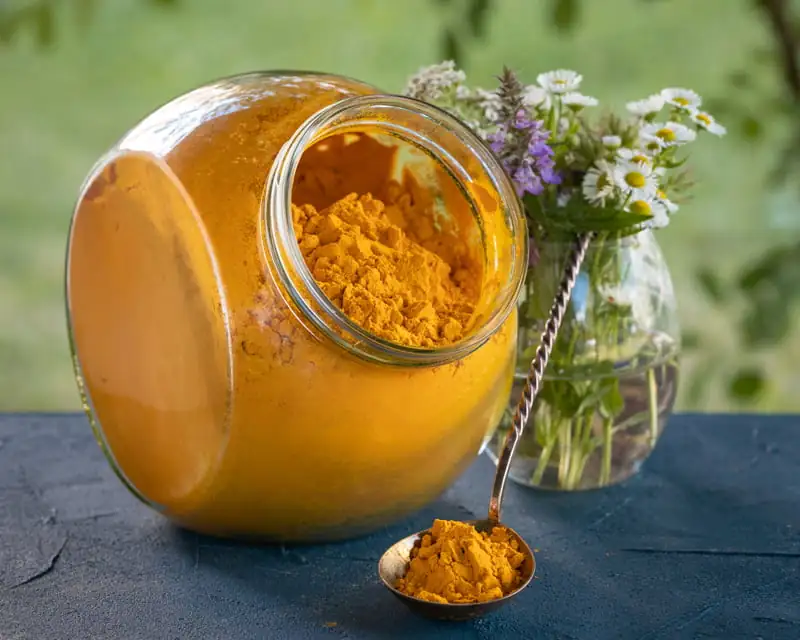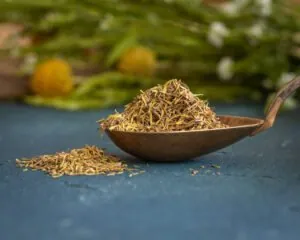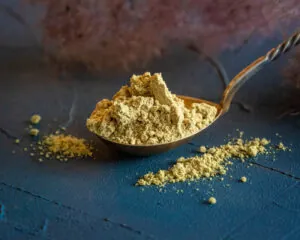Organic turmeric powder
From 1.70€
Turmeric, a bright golden spice, is a staple in many cuisines and traditional medicine systems around the world. Whether consumed fresh or dry, turmeric has impressive health benefits thanks to its active compound curcumin. Turmeric, or Curcuma longa, is aplant in the ginger family (Zingiberaceae) that originates from South-East Asia and has been revered for its healing properties for thousands of years. Its benefits are supported by traditional systems of medicine such as Ayurveda and Traditional Chinese Medicine (TCM), as well as by modern scientific research.
It’s no secret that anything unprocessed has more nutrients. Curcumin is more abundant in fresh turmeric than in powdered form. Some curcumin is lost during the processing stage. Raw turmeric also contains more essential oils than processed turmeric, as drying and processing lose some of its essential oil value.
Health benefits of turmeric
Dried turmeric has a longer shelf life than fresh turmeric, making it convenient to store and use for a long time.
While fresh turmeric has a higher curcumin content, dried turmeric powder is more concentrated, making it an effective way to consume higher doses of curcumin.
Dried turmeric is ground into a powder, making it easy to add to a wide range of recipes, teas and food supplements.
Studies show that curcumin in turmeric powder can inhibit the growth and spread of cancer cells, demonstrating the potential for cancer prevention and complementary therapy.
The neuroprotective properties of curcumin in dried turmeric may help improve brain function and protect against neurodegenerative diseases such as Alzheimer’s.
Turmeric contains curcumin, which has a strong anti-inflammatory effect and can help with arthritis and inflammatory bowel disease.
The antioxidant properties of curcumin in fresh turmeric help to neutralise free radicals, protect cells from oxidative damage and reduce the risk of chronic diseases.
Rich in vitamins, minerals and essential oils, fresh turmeric boosts the immune system and strengthens the body’s defences against infections and diseases.
Fresh and dried turmeric stimulates bile production, aids digestion and improves gut health.
Due to its anti-inflammatory nature, fresh and dried turmeric can provide natural pain relief for a wide range of conditions such as joint and headaches.
Turmeric benefits for the skin
It should be mentioned that turmeric powder has been used for centuries not only in traditional medicine but also in beauty rituals.
Turmeric is rich in antioxidants that neutralise free radicals and protect the skin from oxidative damage, preventing premature ageing and promoting a youthful appearance.
Turmeric powder helps reduce hyperpigmentation and dark spots, promoting an even and bright skin tone.
The slightly grainy texture of turmeric powder acts as a natural exfoliator, removing dead skin cells, unclogging pores and revealing fresh, glowing skin.
Thanks to its antibacterial and antifungal properties, turmeric powder effectively fights acne-causing bacteria and reduces the appearance of blemishes.
Turmeric powder helps heal wounds and minor cuts thanks to its antimicrobial properties.
Regular use of turmeric powder can help reduce fine lines and wrinkles and give a more youthful appearance.
Turmeric can help regulate sebum production, making it suitable for both oily and combination skin.
The antioxidants in turmeric help maintain skin elasticity, prevent sagging and promote a firmer skin texture.
How to use fresh and dry turmeric in food
Fresh turmeric – grate or crush fresh turmeric and add it to curries, stews, soups, smoothies or teas.
Dried turmeric powder – add dry turmeric powder to soups, stews, rice dishes or lentil dishes, even sprinkle it on salads for a warm and distinctive taste.
You can also make tea, and golden milk with turmeric by mixing it with warm plant milk and a little sweetener.
Unfortunately, the curcumin in turmeric is poorly absorbed into the bloodstream. This reduces its health benefits.
However, the addition of black pepper may help. Studies confirm that the combination of black pepper piperine and curcumin in turmeric increases curcumin absorption by up to 2000%.
Combining turmeric with black pepper therefore increases its potential health benefits.
How to use turmeric powder for skin
Turmeric face mask – make a paste by mixing turmeric powder with warm water, apply to the face and leave on for 10-15 minutes before rinsing. This mask will revitalise and revitalise your skin.
Turmeric body scrub – mix turmeric powder with coconut oil and sugar, add your favourite essential oil and you have a gentle exfoliating body scrub.
For acne – Mix a pinch of turmeric powder with a few drops of water and apply directly to pimples or dark areas. Leave for 5-10 minutes.
It should be mentioned that for those with acne, turmeric can be useful not only externally, but also in the diet or as a dietary supplement. Turmeric has digestive, detoxifying and anti-inflammatory properties.
Attention. Turmeric can cause a slight yellowish tinge to the skin, but temporarily (if you use a good quality turmeric), you shouldn’t see any discolouration the next day. Therefore, always perform a patch test before using on a larger area.
For those with sensitive skin, possible allergic reactions should be considered.
Turmeric tea recipe
Ingredients for 1 serving
1 cup of water
1/2 -1 tsp turmeric powder
1/4 – 1/2 teaspoon black pepper
Healthy sweetener to taste
Bring the water to the boil and add the ingredients.
Boil for 5-10 minutes. Sweeten to taste.
Side effects
Digestive problems – both dry and fresh turmeric can cause gastrointestinal upset, especially when used in large doses. It can cause bloating, gas and stomach discomfort in some people.
Turmeric should be avoided in cases of acute hepatitis, jaundice, gallstones, bile duct disease, ulcers and acidity.
Blood-thinning effects – Turmeric’s blood-thinning properties may increase the risk of bleeding, especially when taken in combination with blood-thinning drugs.
Conclusion
Both fresh and dried turmeric have many health benefits thanks to its active compound curcumin. Whether you choose fresh turmeric for its intense flavour or dry turmeric for its convenience and concentrated curcumin content, incorporating this golden spice into your diet can certainly contribute to overall well-being and healthier living.
Sources:
https://www.healthline.com
https://www.hopkinsmedicine.org
https://www.banyanbotanicals.com
NOTE. The information contained herein should not be construed as a recommendation for treatment or other health issues. We encourage you to make personal decisions about your personal health, taking into account a wide range of sources of information.
Organic turmeric powder 100%
1347 kJ/ 322 kcal
Fat 5 g
- of which saturates 1,8 g
Carbohydrates 43,1 g
- of which sugar 3,2 g
Fiber 22,7 g
Protein 9,6 g
Salt 0,07 g
Store tightly in a cool, dry place away from direct sunlight.


